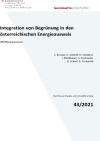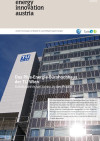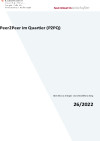Suchergebnisse für "Factsheet: Energietechnologien gestalten, die für alle sinnvoll und nutzbar sind"
Lahof/Lanserhofsiedlung - Path to Zero CO2 - climate-neutral demonstration building in relation to the neighbourhood
The aim is to develop and implement an innovative, climate-neutral neighbourhood concept with various sustainable energy and building technology components. A central element here is the climate-neutral demonstration building in timber construction. This building is equipped with thermal component activation in solid wood and combines innovative energy concepts such as wastewater heat recovery, large photovoltaic systems and a hydrogen system for seasonal energy storage.
ÖGUT-Umweltpreis 2016 - Kategorie „Stadt der Zukunft“: noch bis 30. September einreichen
Mit Unterstützung des BMVIT werden in der Kategorie "Stadt der Zukunft“ VordenkerInnen aus der Industrie- und Energiezukunft gesucht. Einreichschluss ist der 30. September 2016.
DataScience4SmartQuarters - Energy saving potentials through neighbourhood and community planning – Part 2
DataScience4SmartQuarters develops and researches an innovative method for the fast and efficient evaluation of simulation scenarios (building/energy, mobility) for communities.
Integration von Begrünung in den österreichischen Energieausweis (GREENergieausweis)

Anpassung der Berechnungsmodelle im Energieausweis derart, dass Gebäudebegrünung darin möglichst realistisch abgebildet werden kann und Abschätzung zur Akzeptanz einer Umsetzung bei relevanten Stakeholdern.
Schriftenreihe
43/2021
C. Kresser, E. Schriefl, H. Schöberl, I. Mühlbauer, S. Formanek, B. Scharf, G. Frühwirth
Herausgeber: BMK
Deutsch, 71 Seiten
Downloads zur Publikation
Fachexkursion Flandern: Programm am 13. September 2018
Tag 3 der Exkursion: Gent - climate active city
Das Plus-Energie-Bürohochhaus der TU Wien

Gebäudeinnovationen in der Praxis
energy innovation austria
5/2016
Herausgeber: BMVIT und Klima- und Energiefonds
Deutsch, 8 Seiten
Downloads zur Publikation
FavoriteFlows – Innovative solutions for water and energy cycles in buildings for a climate fit city
Demonstration of detailed planning work and implementation of water cycles (building-integrated constructed wetland wastewater treatment) and energy cycles (wastewater heat exchanger) on a large residential apartment development for climate resilience, resource efficiency and high living standard.
Kooperativ Ternitz - New cooperative models for a climate resilient settlement revitalization
Kooperativ Ternitz is developing innovative cooperation models for settlement development as a contribution to a climate-neutral city. These models are being implemented in the Dreiersiedlung with a focus on sustainable mobility, green and blue infrastructure, and the revitalization of the settlement center, the results are being made available to stakeholders.
Tariffs4all - Participation of the citizens from Bruck in the energy transition for all
The project responds to the challenges of participation in the energy transition in the municipality of Bruck/Mur by exploring the possibilities of Power Purchase Agreements (PPAs), Peer to Peer Trading (P2P Trading) and virtual metering points for generation plants be developed and implemented as a basis for new tariff/financing models.
sustAIn4Build - AI competence for sustainable building management in climate neutral cities
The objective of the project sustAIn4Build is to increase energy efficiency and sustainability in the building sector by using artificial intelligence (AI). Industry-specific training programs support Austrian companies to develop a workflow for integrating AI technologies into their processes, enabling them to develop resource-saving, cost-effective and sustainable solutions. This strengthens their competitiveness and contributes to the achievement of European decarbonisation goals.
Circular Standards: Development of a circular standard-detail-catalogue
In this research project, the technical design of standardized constructions details is the subject of investigation. Construction details will be researched, analyzed and evaluated and (further) developed or revised with regard to the parameter "recyclability". The expected result consists of circular-standard-details and the identification of problem areas and opportunities.
GreenFDT – Green Façade Digital Twin
In an interdisciplinary framework, the possibilities for optimizing the rear ventilation distance of façade greening elements and their potential impact on indoor and urban climate are being investigated. The precise and comprehensive investigation of these relationships is made possible by the extensive deployment of sensors and measuring tools and furthermore the development and integration of a digital twin in a BIM model.
sewageENERGYrecovery - Performance comparison of different wastewater heat recovery systems for renewable heat generation
Independent detailed testing of the performance and efficiency of different wastewater heat recovery systems in actual operation by analysing measurement data. Evaluation of the analysed systems with regard to their optimal application possibilities.
Fit4Klim - Fit through education for the climate
The aim of the project is to develop and test customised training courses to qualify cities and municipalities in the areas of climate change adaptation and climate protection, spatial planning, green finance, energy and mobility.
Climate Pioneer Districts Graz (KPQ Graz): Preparation of the climate-neutral districts ÖBB Eastern Railway Station and Smart City North-West
The Climate Pioneer Districts Graz (KPQ Graz) project is preparing the development of the districts "ÖBB Eastern Railway Station" and "Smart City North-West" in Graz towards climate neutrality. Based on the lessons learned of the evaluation of the already realised district "Smart City Graz", an innovative district concept is being created for the infrastructure topics of energy, mobility, green/open space and social sustainability. The central goal of the exploration is the subsequent realization of at least one of the two pilot quarters.
Climate Quarter Melk
Radical and comprehensive transformation of a city quarter in the small town of Melk, Lower Austria, involving the areas of urban planning, landscape architecture, traffic planning and co-creation - demonstrated by the implementation and rededication of a parking lot to an urban, inner-city climate forest within project life-time.
SIMPLE AD Evaluator - S.I.M.P.L.E. Sustainable Integration Modeling and Predictive Leveraging Evaluator
The SIMPLE AD Evaluator fills an existing gap in sustainable local planning by providing a low-threshold and collaborative evaluation tool for early planning phases. By linking questionnaires with System Dynamics models, the tool delivers well-founded decision-making foundations and customized sustainability checklists. This supports municipalities, project developers, and decision-makers in achieving a strategic and cost-efficient sustainable transformation from concept to implementation.
NEBKrit - Quality criteria for buildings and neighbourhoods on the basis of the New European Bauhaus
Develop criteria of aesthetics and social inclusion based on the values of the New European Bauhaus to complement existing sustainability criteria in order to evaluate buildings and neighbourhoods more broadly. Since todayʼs necessary transformation of the economy always includes cultural and social aspects, such a broader assessment makes more sense than todayʼs usual methods.
Kontakt
P2PQ - Peer2Peer im Quartier

Das Projekt Peer2Peer im Quartier befasst sich mit der konkreten Umsetzung von Anwendungen zu Photovoltaik-Eigenverbrauchsoptimierung sowie Peer-to-Peer-Beziehungen auf Basis der Blockchain-Technologie in Quartieren und deren Validierung im Echtbetrieb.
Schriftenreihe
26/2022
Herausgeber: BMK
Deutsch, 43 Seiten
